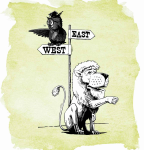Every year the Czech Republic hosts a conference organised by the Forum 2000 Foundation in Prague. This year–the 20th edition, held from 16-19 October 2016–coincided with the 80th birth anniversary of Vaclav Havel, the late first president of the Czech Republic.
Havel, who founded Forum 2000 in 1996 to celebrate the values of democracy, especially, respect for human rights, was a lifelong dissident and non-violent activist in an era that saw a series of brutal repressions in the former Eastern Bloc countries under Soviet control. As the first president of the Czech Republic after the fall of the Berlin Wall, his enduring legacy lies in having steered the first, and arguably, only peaceful separation of a nation state: the Czech Republic and Slovakia share excellent bilateral relations in stark contrast to the hostility between India and Pakistan that persists 70 years after the British mediated partition.
Forum 2000 conferences are conceived of as “festivals of democracy”. The theme, annually, is a variant of “the courage to take responsibility”. Earlier, it referred to democracy promotion; this year’s confabulations were tinged with the anxiety to sustain democracy in the face of numerous challenges. The first was the challenge to the post-Cold War, West-dominated order posed by a resurgent, nationalistic Russia. This lent a special urgency to the efforts of Central and Eastern European countries to strengthen economic links with the EU and military links with NATO.
Secondly, the discussions were imbued with the recognition that globalisation had generated losers along with winners in the U.S. and Europe, leading to the strengthening of right wing politics and hyper nationalism, as reflected in the vote in the UK for Brexit and anti-EU postures of right wing political parties in other European states.
But the cause of the greatest apprehension was the absence of moral leadership, symbolised by the rise in the U.S. of Donald Trump. This was being felt in an increasingly globalised economy where social media had created an atomised society, pushing the West towards an allegedly “post-truth world” in which sentiment mattered more than fact.
What was disappointing about the numerous discussions was the complacency with which speakers across panels limited their observations to the West, never acknowledging the decline of its economic weight. More importantly, there was a lack of creative thinking in an inward looking West. Nor was there any willingness to accept that western democratic processes and institutions had atrophied and required rethinking.
A pleasant surprise for me was that the 2016 edition of the conference came close to being a festival of friendship with India. The most prominent delegate was His Holiness the 14th Dalai Lama. Over the course of multiple speaking engagements, he made two observations that I found profoundly significant. While speaking about the paradox of religion, he recalled his personal journey–from believing in the superiority of Buddhism to the discovery of religious pluralism after fleeing Tibet in 1959 to live in India.
Second, he addressed the issue of attaching religious labels to terrorism. He recounted his unease on viewing the cover of an issue of Time magazine that bore a saffron-robed Buddhist monk, was titled “The face of Buddhist terrorism”, and was a report on the violence perpetrated against the Rohingya minority in Myanmar. He urged people to disassociate acts of terror, committed by radicals in the name of Islam or any other religion, from the core principles of that religion.
Speakers on a panel examined the similarities in the philosophy of non-violent resistance that both Mahatma Gandhi and Havel practiced in the face of overwhelming force. In a political essay, Havel termed such resistance the ‘power of the powerless’. Gandhi’s and Havel’s attempts to ‘live in truth’ evoked immense respect compared to the current crop of self-serving leaders populating western politics.
One of the discussions I was part of was titled, “Leading by example: can Indian democracy trump Chinese authoritarianism”? Not much convincing of the superiority and resilience of open democratic models of governance was required for an Eastern European audience, which has experienced both authoritarianism in its recent history and the well being that democracy confers.
The second panel I was a participant in focused on “Dynasties, Democracy and Power”, a discussion on whether it was appropriate for women to rise in politics based on family links. Considering the reality of how women had been discriminated against in public life in all societies, dynasty was the only way for them to rise in politics. Their exclusion was becoming more pronounced, given the increasing concentration of wealth in a small, mostly male, elite, and the rising cost of elections in democratic societies.
There were no Chinese delegates at the conference probably because of the presence of H.H the Dalai Lama. Nor were there any prominent Russians to give balance to the allegations against Putin and Russian propaganda, probably because they saw no value in participating in such a biased scenario. However, entertaining critiques of their thinking would be the way for Europe to gain depth and perspective in addressing the tensions within its society.
Neelam Deo is Co-founder and Director, Gateway House: Indian Council on Global Relations; She has been the Indian Ambassador to Denmark and Ivory Coast; and former Consul General in New York.
This blog was exclusively written for Gateway House: Indian Council on Global Relations. You can read more exclusive blogs here.
For interview requests with the author, or for permission to republish, please contact outreach@gatewayhouse.in, or call 022 22023371.
©Copyright 2016 Gateway House: Indian Council on Global Relations. All rights reserved. Any unauthorized copying or reproduction is strictly prohibited.


